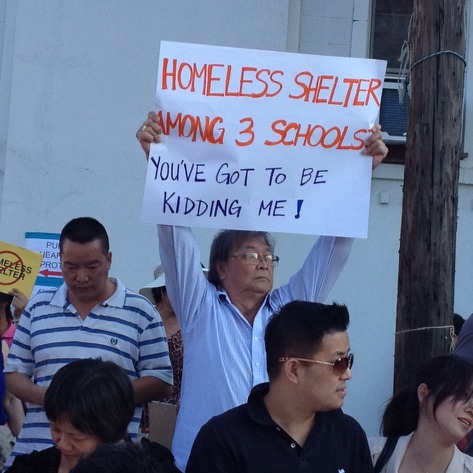
A former drug rehab site in Rockaway is the latest in a string of homeless shelter site proposals to come out of the city Department of Homeless Services. File Photo
A former drug rehabilitation center in Rockaway is being converted into a homeless shelter, the city said, despite pleas from elected officials and residents living nearby who argued they were not given a fair warning.
Homeless shelter proposals have left parts of the borough in frenzy over recent months with similar instances occurring in East Elmhurst and Glendale, where residents in each respective community have strongly opposed plans to install shelters in their neighborhoods. The latest spot – a former Daytop Village drug rehab center on Beach 65th Street in Rockaway – was said to become home to 155 homeless families, the Department of Homeless Services said.
But state Sen. Joseph Addabbo (D-Howard Beach) said he and the southern Queens community largely opposed these shelters being brought into the community without much warning or input. He met with DOH Commissioner Gilbert Taylor and other city officials on Tuesday to discuss the city’s obligation to helping the homeless.
“I once again expressed my opposition to the sites in Glendale and Rockaway based on the proposed size and location of the shelters, along with the lack of proper transportation and infrastructure,” Addabbo said. “The meeting ended with the concerns of many elected officials heard and the commitment of the mayor’s office to continue its consideration of those concerns.”
The city released a report last month estimated there were 3,357 unsheltered individuals living in the streets, parks and other public spaces throughout the city in January. That number, the DHS said, was six percent higher than the same time in 2013. The agency also found there were 1,808 individuals living in the city’s subway system – a figure that dropped two percent since last year.
“DHS is working aggressively on new measures to address the issue and will move forward with the Metropolitan Transportation Authority (MTA) to focus on subway outreach with the goal of engaging more homeless individuals and offering services, shelter, and housing,” Taylor said. “We are also expanding our joint efforts with the NYPD’s Homeless Outreach Unit to offer much needed services through a respectful collaborative process.”
The Rockaway news came soon after the city also approved plans to install a shelter at the former Westway Motel in East Elmhurst to house more than 100 families, the city said. The site was not far from another site at the center of controversy, where protestors argued the Pan Am Hotel should also not be converted into a shelter.
The Westway proposal drew a joint letter of concern from a slew of Queens elected officials, including U.S. Rep. Joe Crowley (D-Jackson Heights), state Sen. Jose Peralta (D-East Elmhurst) and several others from the area.
“While we appreciate that DHS is legally required to provide shelter for the homeless, the agency’s failure to provide any notification to the people currently living in the area who are impacted by its implementation is unacceptable,” the letter said.
City Comptroller Scott Stringer penned a letter to the DHS just last week acknowledging the city’s increase in the number of homeless individuals and families, but also expressing concern over how the agency is handling it.
“Especially concerning to my office is the emergency contracting approach that the Department of Homeless Services has employed to site new facilities in neighborhoods with minimal community consultation,” Stringer said. “Time and time again, I have seen communities that were traditionally welcoming of shelter facilities and supportive housing react negatively to a rushed DHS placement due to a failure to consider either legitimate potential neighborhood impacts or health of the families the residences are intended to support.”
By Phil Corso
